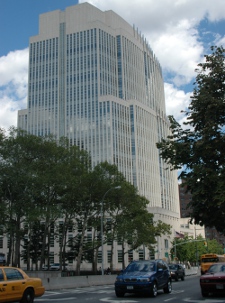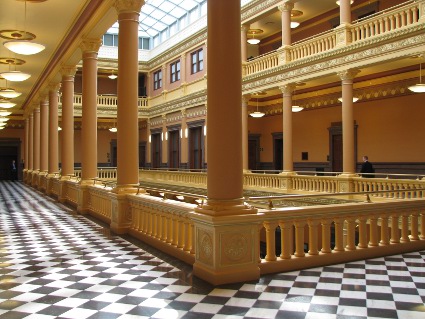CADMAN PLAZA EAST — A thin beige shroud still surrounds the main post office building in Downtown Brooklyn, hiding within its walls one of the most beautiful courthouses in the city, as well as, ironically, the federal prosecutors office that has exposed one of the biggest construction scandals in city history.
From behind the scaffolding that encompasses the building on Cadman Plaza East, U.S. Attorney Loretta Lynch announced earlier this week that the construction company whose work she passes every morning when she enters her office has agreed to pay up to $56 million in penalties and restitution.
 Lynch said James Abadie, who formerly led the construction company’s New York office, pleaded guilty Tuesday to conspiring to commit mail and wire fraud for overbilling clients for more than a decade. Abadie, 55, faces up to 20 years in prison.
Lynch said James Abadie, who formerly led the construction company’s New York office, pleaded guilty Tuesday to conspiring to commit mail and wire fraud for overbilling clients for more than a decade. Abadie, 55, faces up to 20 years in prison.
Bovis Lend Lease, now called Lend Lease U.S. Construction, has worked on numerous notable buildings and projects in Brooklyn and throughout New York City — including Citi Field, where the Mets play, and the September 11 Memorial.
Across Tillary Street from where Lynch’s U.S. Attorney’s Office for the Eastern District of New York is located, the Theodore Roosevelt federal courthouse towers over Cadman Plaza Park. It, too, is a product of Bovis’ general contractor work.
Widely recognized as one of the more beautiful new buildings to decorate the constantly rising Brooklyn skyline, the 15-story Brooklyn federal courthouse opened in 2006. The year before, within the post office building, the U.S. Bankruptcy Court was completed, revealing within an architectural masterpiece.
 It appeared Bovis was doing good work. Locals boasted of both edifices.
It appeared Bovis was doing good work. Locals boasted of both edifices.
The good work, perhaps, just cost a few million dollars too much — with “few” meaning more like a dozen.
A deferred prosecution agreement filed in the U.S. District Court that Bovis helped build in Brooklyn described the $56 million penalty and restitution to be paid by the company, which is actually a division of an international construction company that employed more than 1,000 workers during the 10-year stretch from 1999 through 2009.
Bovis changed its name to Lend Lease after finding itself involved in another infamous city scandal, when two firefighters died in the Deutsche Bank building fire near the Ground Zero site. Bovis had been hired to help with the demolition when the fire broke out and fatally trapped firefighters Robert Beddia and Joseph Graffagnino, of Bay Ridge.
Yet Bovis, or Lend Lease, continued to work on city landmarks, duping the city with padded bills.
FBI Assistant Director-in-Charge Janice K. Fedarcyk said the deal capped a three-year investigation “into a systemic pattern of audacious fraud by one of the world’s largest construction firms.”
Lynch said the company “deceived their customers and stole taxpayer dollars” while abusing a program designed to benefit and train minority contractors.
“The defense of ‘everyone does it’ will not be a shield against law enforcement,” she said.
In court papers, prosecutors described how the company routinely overbilled clients including federal, state and local government contracting agencies.
The company regularly added up to two hours of unworked overtime to timesheets for labor foremen and charged customers for weeks when foremen were on vacation or out sick, court papers said.
The government said the company also duped the states of New York and New Jersey into believing it had complied with programs designed to boost the participation of small construction companies and companies owned by women or minorities on public construction projects when it had not.
As an example of how minority hiring requirements were dodged, prosecutors described an instance in which Lend Lease U.S. Construction falsely claimed that a company certified as a minority hiring unit would perform 100 percent of the general contract work on construction at the Bronx Criminal Courthouse.
In reality, Lend Lease U.S. Construction performed most of the work itself by directly managing the union, the government said. It said the company placed many of its long-term union employees on the minority-hiring-compliant company’s payroll, hired other workers, and relegated the smaller company’s role to providing paychecks for work performed by or at the direction of Lend Lease U.S. Construction employees.
In a statement, the company said it has fully and extensively cooperated in the probe since 2009.
“We accept responsibility for what happened in the past and have agreed to continue to make restitution to the affected clients,” said Robert McNamara, chief executive officer of Lend Lease Americas region.
Other projects on which Bovis worked included Grand Central Terminal and the American Museum of Natural History in Manhattan and various schools in New Jersey’s Abbott districts, where authorities say the company also acted fraudulently to avoid complying with minority hiring laws.
The deferred prosecution agreement spares the company from three counts of conspiracy to commit mail and wire fraud if it carries out its promises over the next two years.
The company has pledged to pay the $40.5 million penalty, along with restitution of more than $15 million to victims of the overbilling scheme, and to comply in the future with all federal and state criminal laws. It has already paid the city of New York $5 million, $4 million of which is credited against the $40.5 million penalty.
The company also acknowledged in the deal that it has fired or forced resignations of officers and employees responsible for the misdeeds and reduced the responsibilities of others involved in the misconduct.
The government said it permitted the company to avoid criminal prosecution because of its extensive cooperation, its acceptance of responsibility, remedial actions it took voluntarily and its assurances that it will be a model of integrity in the construction industry in New York.